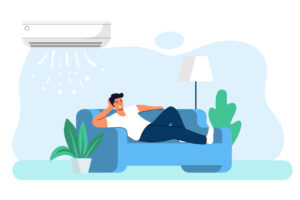The HVAC system is one of the biggest energy users in your Aiken, GA house, and homeowners are continuously looking for ways to make theirs more efficient. There are various maintenance strategies you can adopt to keep your unit performing optimally and reduce your energy bills. Check out the following tips to help you maximize your HVAC system’s efficiency this spring.
Invest in a Smart Thermostat
The thermostat acts as the brain of your HVAC unit. It assesses the air temperature in your house and communicates the cooling or heating needs to your system. Replacing your old thermostat with a smart model will help improve your HVAC system’s efficiency.
A smart thermostat gives you better control of your house temperature. You can even connect the thermostat to your WiFi system and adjust it remotely from your mobile devices. For instance, you can schedule it to increase the temperature when you’re out of the house, then turn it back down when you’re returning.
This way, you won’t waste energy since the HVAC system will only cool the house when it’s occupied. Energy Star reports that adjusting your thermostat setting as high as comfortably possible will help you save around 10% on cooling bills each year.
Schedule Regular HVAC System Maintenance
Planning for regular HVAC tune-ups is another great way to improve your system’s efficiency. During a maintenance appointment, the technician can uncover any underlying issues in your system that can impede its effectiveness.
A professional will also clean or change air filters to promote better airflow. Note that your system will have to work extra hard with a clogged air filter to produce the desired temperature, and this translates to higher utility bills.
During maintenance, a professional will also clean the coils, inspect the heat exchanger, reversing valve, refrigerant level, lubricate any moving components and inspect the wiring. This helps prepare your system to handle the summer heat.
Clean Around the HVAC System
Clear any obstructions near your outdoor HVAC component to allow proper airflow. During spring, grass and other plants may grow around your outdoor unit, limiting its ability to pull in the air needed to control indoor temperatures. You need to clear away any weeds and keep plants at least 18 inches from your unit.
Get rid of vegetation debris since it can get trapped into the metal film and interfere with the heat exchanger. Indoors, move furniture away from vents, and clean any buildup of dust and other particles from these areas to allow for sufficient airflow.
Invest in Proactive Repairs
With a damaged system, spring is the best time to call for air conditioning repairs. At this time, technicians are less busy answering emergency calls. If you notice a bad odor or strange noises coming from your system, you need to have a professional check it.
Additionally, a change in energy flow or increased energy bills indicates a possible ductwork leak. Have a professional seal the leak to prevent conditioned air from escaping. Frequent cycles, hot and cold spots and excess moisture are other signs that your system needs repair.
Use Your Ceiling Fan
Running a ceiling fan along with your HVAC unit helps improve your system’s efficiency. On hot days, set the fan in a counterclockwise direction to allow the cooler air to come down to the ground level. The airflow causes sweat to evaporate from your skin, creating a wind-chill effect.
As a result, you may be able to increase the thermostat setting allowing your HVAC system to run for a shorter period to create the desired comfort level for you. This improves your unit’s energy efficiency, which can reduce your cooling or heating bills.
By implementing the above tips and calling for professional assistance when necessary, you can improve your HVAC system’s efficiency and extend its lifespan as well. Contact us at Doc Savage Heating & Air Conditioning today and book an appointment for exceptional HVAC system maintenance.
Image provided by iStock



